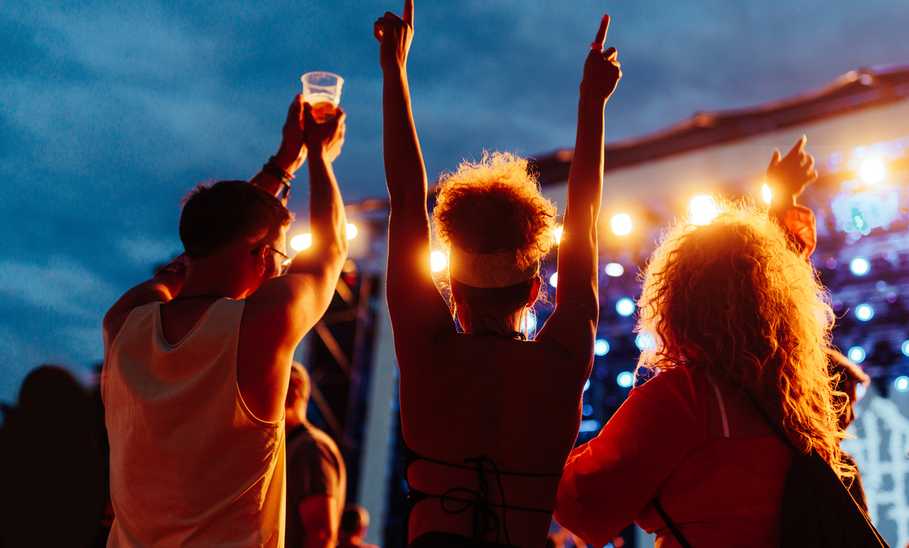Why Are Concert Tickets So Expensive? And Can Anyone Do Anything about it?


Our evaluations and opinions are not influenced by our advertising relationships, but we may earn a commission from our partners’ links. This content is created by TIME Stamped, under TIME’s direction and produced in accordance with TIME’s editorial guidelines and overseen by TIME’s editorial staff. Learn more about it.
My first “real” concert was Elton John at the Blossom Music Center in Cleveland, Ohio. I think lawn seats cost something like $15. I also remember seeing the Violent Femmes in a seedy venue that was once a movie theater on the “bad” side of Cleveland in 1986 for maybe eight dollars. I also saw Peter Gabriel in the late 1980s and somehow was able to afford a seat close enough to the stage that I was one of those who carried him overhead when he did his crowd surfing dive during Lay Your Hands on Me. In 2003 or ‘04, I saw David Bowie at The Backyard in Austin, Texas (for probably about $60); hands down, one of the best concerts I’ve ever attended, in large part because the Backyard is a comparatively small venue.
I haven’t been to a music concert since that David Bowie show at the Backyard 20 years ago. While one reason is that I don’t particularly care for crowds, another is that tickets to see shows have gotten quite expensive (which is likely news to no one) and prohibitively so, for many people.
I talked to Danny Frenkel, a former Meta executive who created his own start-up called PunchUp Live to support comedians in their ability to turn social media success into actual live event ticket sales, and Joel Smith, an audio expert and founder of the music hub AllAxess.com, about why concert ticket prices are so expensive and how we ended up in the current situation of Ticketmaster operating what could be considered an online ticket purchase monopoly.
One small part of the reason concert tickets cost much more than they used to is that producing a concert simply requires more money these days. Things like venues, production elements, and talent fees are more expensive, Smith tells me.
This relative inflation, however, doesn’t account for—or adequately explain—the incredibly lofty price that many concert tickets reach; in some cases, as much as $1000 or more.
Venues make money from promoters to put on concerts, often charging a facility fee which is added on to the cost of each ticket. Promoters, in turn, earn their money from ticket sales.
Some venues, though, have exclusive deals with certain promoters, meaning the promoter is the only one who can book that specific venue. Most every concert space or building implements a ticketing contract which typically requires promoters to pay in advance.
Some of the major concert promoters include Live Nation (which owns Ticketmaster), AEG, Another Planet Entertainment, Outback Presents, and The Bowery Presents.
Smith says that promoters consider a few main things when setting ticket prices: “how popular the artist is, the costs of putting on a big show with lights and stages, the size and location of the venue, and any extra fees they need to cover.”
More in-demand artists can warrant higher prices. Obviously, if tickets don’t sell, promoters lose money.
“The promoter works with the artist's team to find pricing that will sell well but also make them money,” explains Smith. “While Ticketmaster has a partnership with Live Nation to sell tickets for their shows, they don’t directly control pricing or make money from inflated resale prices on their own.”
“The biggest name artists usually get approval over the starting ticket price tiers through their touring contract with the promoter,” says Smith. “They may also get a cut from the most expensive 'platinum' tickets closest to the stage, but they can't control the resale prices once those initial tickets are sold.”
Smith says that the impact of streaming services may also factor into how much an artist decides to charge for tickets to see them live.
“With album sales declining, artists make less money that way,” he says, explaining that one way they can make up for that loss of revenue is through touring and higher ticket prices.
Some very popular artists have more control over setting those higher ticket prices to maximize profits from their shows.
“Artists wield varying degrees of influence over ticket prices for their concerts,” explains Frenkel. Some delegate pricing decisions to their management or promoters; others take a more hands-on approach, setting limits on ticket costs to maintain affordability for their fan base.
While the intentions behind this are positive, he says, “Sometimes it backfires by creating more incentive for ticket resellers to try to acquire those tickets and place them on secondary ticketing platforms at higher prices.”
“Companies like Ticketmaster take a hefty cut,” says Smith, “but resellers exploiting limited supply make things much worse by buying up tons of tickets to resell at very high markups.”
Ticketmaster is basically the only ticket seller with the technology to sell high-demand tickets — until, of course, that technology is put to the test and fails, as it did during the sale of Taylor Swift’s Eras Tour (more on that below).
“While Ticketmaster is primarily known as a ticketing service, Live Nation — Ticketmaster's parent company — also operates as a major promoter in the entertainment industry,” says Frenkel.
This relationship is the crux of why many feel that Ticketmaster is a huge part of the expensive concert ticket problem. A coalition of activist groups joined together to form “Break Up Ticketmaster,” which is dedicated to getting the Department of Justice to reverse the 2010 merger of the two companies. Currently, according to data on the Break Up Ticketmaster site, Live Nation and Ticketmaster control 70% of the market. This means, according to Break Up Ticketmaster, they face little competition in selling tickets and can set prices wherever they want by “hiking up ticket prices and charging junk fees.” They also operate both a primary ticketing platform and a secondary/resale site.
Lawsuits have resulted and in 2023, President Biden called for action to “crack down on hidden fees” in both private sector ticketing and travel businesses (including airlines).
If you want to read the Break Up Ticketmaster Coalition’s testimony for the record of the Senate Judiciary Committee, check it out here. It outlines how Live Nation/Ticketmaster has significant positions in the promoter, venue, management, and secondary resale lines of business.
And here is the White House’s statement on how some of the companies in question are saying they will make new commitments to “improve the purchasing experience of tens of millions of customers annually.”
Considering it is almost a full year after the release of this statement and we’re still talking about the exorbitant price of concert tickets, I’m not sure how successful any of them have been in their new “commitments.”
On May 23rd, 2024, the Justice Department filed an antitrust lawsuit in federal court in Manhattan against Ticketmaster and Live Nation Entertainment “accusing them of running an illegal monopoly over live events in America,” reported Time Magazine.
Hopefully, this will result in significant changes in the fees consumers pay, ultimately making live events more accessible for everyone and potentially breaking up the Ticketmaster/Live Nation partnership. Don’t expect any changes soon, though. This is likely to be a long trial that could take up to a year or more to commence.

Resellers include sites like StubHub and SeatGeek. Smith says, “Resellers use automated software programs (bots) to instantly purchase piles of tickets the moment they go on sale.” This helps to create a limited supply, and consequently, they resell them on secondary markets at massively inflated prices that true fans can't afford. “It's an industry-scale problem driving up costs,” Smith says.
“While secondary ticketing platforms serve a valuable role in providing flexibility for consumers who may need to buy or sell tickets outside of the initial on-sale period, the presence of professional resellers can sometimes distort the ticket market, leading to inflated prices and reduced availability for genuine fans,” explains Frenkel.
Sophisticated resellers may employ advanced tactics such as automated bots to purchase large quantities of tickets, exacerbating scarcity and driving up prices on the secondary market.
Taylor Swift, obviously.
Others include Beyonce, Bruce Springsteen and Adele, garnering prices as high as $1,000. According to a list released by Gametime in late 2023 and reported by a variety of news outlets, last minute tickets for Adele’s concert went for $1,011 while Taylor Swift’s reached $958. Harvard Business Review reported that Bruce Springsteen tickets rose to over $5,000 for his first concert performance in five years in 2023. Data from the Bureau of Labor Statistics showed that the average ticket price for movies, concerts and theater in April 2024 was around $225, a steady and significant increase from previous years.
The answer to this question is one word: demand. Add that to the fact that fans don’t seem deterred by prices that may be as much as their monthly rent or mortgage payment and you create the perfect environment for exploitation.
Which resellers are quick to do—buying up tickets as soon as they go on sale and then adding a hefty upcharge to resell. And still, fans will pay for it.
The recent Ticketmaster/Taylor Swift debacle, which you’re likely familiar with (and mentioned above), involved something called Verified Fan Registration.
Verified Fan registration on Ticketmaster is meant to manage high-demand sales and recognize and lock out any bots. Unfortunately, for Taylor Swift’s Eras Tour, the process failed. Many fans had codes that didn’t work, while others got as far as the check-out process only to be booted off the site once they attempted to pay. Ultimately, Ticketmaster’s systems crashed, unable to handle the onslaught of Swifties.
The New York Times called it an example of “extraordinary demand for a highly desired commodity in very limited supply.”
Frenkel says that promoters play a pivotal role in setting ticket prices for concerts and events. “They draw on a combination of historical data and industry insights to determine the optimal pricing strategy.”
By analyzing past ticketing data for a particular artist or venue, they can gauge demand levels and adjust prices accordingly. Additionally, Frenkel explains, they keep a close eye on broader trends within the entertainment industry to ensure their pricing remains competitive and reflective of market conditions.
At PunchUp Live, Frenkel says they’re taking this approach to the next level by “pioneering a predictive modeling system.”
The model not only uses historical ticketing data but also incorporates advanced algorithms to forecast the “likelihood of recent content viewers converting into ticket purchasers.”
“By staying ahead of the curve and accurately predicting demand,” Frenkel says, “we aim to optimize ticket prices for both promoters and consumers, maximizing revenue while ensuring accessibility for fans.”

According to a 2018 report by the Government Accountability Office, fees represented, on average, 27% of final concert ticket prices, and the lower the actual price of the ticket, the higher the fees were. Which seems rather ridiculous.
“In addition to the base ticket price consumers often encounter various fees when purchasing tickets for live events,” says Frenkel.
One of the most common ones is the service fee. Sometimes called a convenience fee, which Frenkel says typically covers the cost of ticket processing, distribution, and other administrative expenses.
Other fees may include facility fees, which, as mentioned earlier, are set by the venue and go towards maintenance, security, and other operational costs. There are also processing fees.
“These may be separate from service fees and cover the cost of handling your specific order, like credit card processing or handling physical tickets,” explains Smith.
And, then, of course, there are ticket taxes, which are government-imposed and usually vary depending on location.
In December 2023, the Senate introduced a bill called the Fans First Act which would require disclosure of the total amount a ticket will cost, including any fees up front, as well as indicate which seat or section the ticket is specifically for and whether or not it’s being sold by a reseller or not. This and the pending lawsuits and potential lawsuits against Ticketmaster will hopefully contribute to more equitable ticket prices in the future—or, at the very least, more transparent ones.
The information presented here is created by TIME Stamped and overseen by TIME editorial staff. To learn more, see our About Us page.



